A 12-year-old schoolgirl has achieved the maximum score possible in a Mensa IQ test, a feat achieved by only 1% of those who sit the society’s entry paper.
Lydia Sebastian completed the Cattell III B paper supervised by Mensa, the society for people with high IQs, with minutes to spare at the sitting at Birkbeck College, London.
Lydia had asked her parents for an entire year to let her take the test paper, eventually sitting the exam during her school holidays.
Her determination paid off, with Lydia scoring 162 – the maximum possible result on the test paper, which primarily measures verbal reasoning ability.
Lydia, from Langham in Essex, said: “At first, I was really nervous but once I started, it was much easier than I expected it to be and then I relaxed.
“I gave it my best shot really,” Lydia said, who is to start her second year at Colchester County high school for girls.
She said the paper challenged her language skills, including analogies and definitions, and her sense of logic.
Her father, Arun Sebastian, a radiologist at Colchester general hospital, said his daughter “had looked at the websites for the IQ tests herself and had shown an interest in them and talked to my wife about them, so she said: ‘Why don’t you go ahead with them?’
“She was talking about it for over a year. When I heard she had the maximum possible mark, I was overwhelmed, and so was my wife.”
The schoolgirl has read all seven of the Harry Potter books in the series three times. Lydia, an only child, is talented in other areas and has been playing the violin since aged four. She starting talking at the age of just six months, her parents said.
“At the time I was a trainee doctor and my wife was studying chemistry and I was away at the weekends. She used to say a few words to me on the phone,” her father said.
Although rare, with only 1% of people who take the Mensa test achieving the highest score, Lydia joins Nicole Barr, a 12-year-old from Harlow, Essex, as well as Aahil Jouher, a 10-year-old from Blackburn, in achieving perfect scores this year.
Dr Amanda Potter, a psychologist at the British Psychological Society, said: “While having a sufficient cognitive ability or IQ is important for any individual to succeed, both emotional intelligence and social intelligence are also critical.”
She added all three types of intelligence were important for the success of an individual. IQ tests were still relevant, however, as they helped organisations assess an individual’s future capability.
“We test IQ because we want to understand to what extent will they have learning agility and be able to take on new information, deal with ambiguity and complexity and think on their feet,” she said.
The Mensa-supervised test for IQ, or intelligence quotient, is split into two sections that attempt to measure mental agility. Cattell III B has 150 questions, often assessing comprehension through passages of texts, while the maximum score that can be achieved is 161 for adults, and 162 for under-18s.
The second paper, Cattell Culture Fair III A, is largely diagrammatical, with 50 questions and maximum score of 183. It includes no words – eliminating the disadvantage of having English as an additional language, or language-processing issues such as dyslexia, according to the Mensa society.
A top 2% score on either would result in an invitation to join Mensa, and there are currently just under 1,500 society members aged under 18.
The youngest member of British Mensa – which was founded in Oxford in 1946 – is four years old, while the oldest is 104.
Other notable peeople reported to have qualified for Mensa membership include TV presenter Carol Vorderman, journalist Bill Buckley, Adrian Moorhouse, the Olympic swimming champion, and Roger Squires, the Guinness World Record crossword compiler.
Sample questions from British Mensa (answers below)
1. Rearrange the letters of DUE CROP to give a word with a similar meaning.
What is it?
2. Add together three of the following numbers each time to reach a total of 60. How many different combinations are there?
2 3 5 10 15 20 25 50
3. In the box provided, place a five-letter word which can be attached to the end of the given words to form four longer words.
What is the five-letter word?

4. Replace the blanks in the following sentence with two five-letter words. The same five letters must be used for both words. What are the words?
The BLANK told his class that he had been BLANK fishing during the holiday.
5. What letter should replace the question mark?
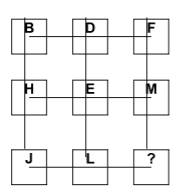
6. What number is missing from the following sequence?
4 9 16 25 ? 49 64 81
7. Complete the square with the letters of MENSA. When completed no row, column or diagonal line of any length will contain the same letter more than once. What letter should replace the question mark?
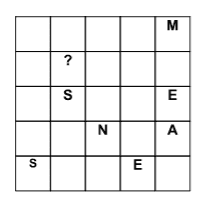
8. Assume you are using a basic calculator and press the numbers in order, replacing each question mark with a mathematical sign. Plus, minus, multiply and divide can each be used once only. What is the highest number you can possibly score?
6 ? 2 ? 2 ? 4 ? 2 =
Answers
- Produce.
- Four (20, 20, 20)(25, 20, 15)(25, 25, 10)(50, 5, 5)
- Chair
- Tutor and trout
- V. On each row the alphabetical position of the first letter plus the alphabetical position of the second letter gives the alphabetical position of the third letter.
- 36. They are all square numbers.
- M.
- 18 using divide, plus, multiply and minus
Up to 4 correct answers: Good, but perhaps you are a little out of practice
4-6 correct answers: Very good
6-8 correct answers: Excellent – you may be eligible to join Mensa
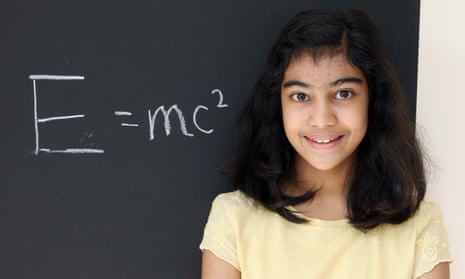
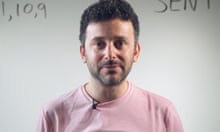
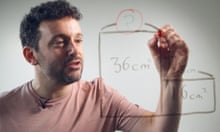
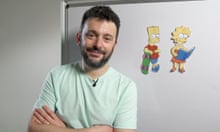
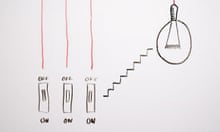


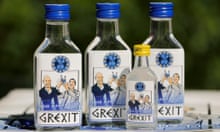
Comments (…)
Sign in or create your Guardian account to join the discussion